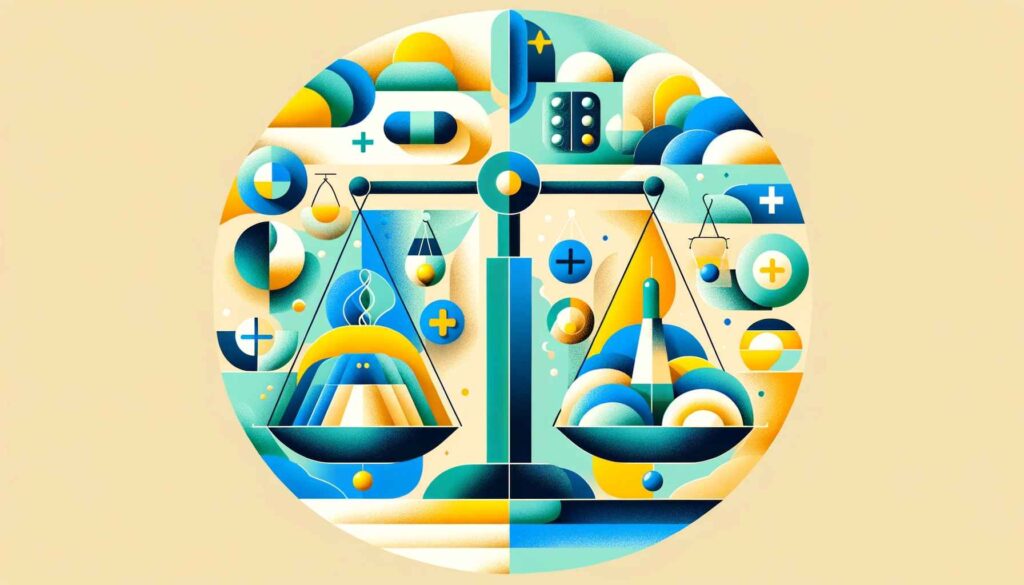On a sunny Saturday afternoon, Alex, a college student and an avid explorer of psychoactive substances, decided to experiment with a new herbal blend recommended by friends. Within hours of consumption, what began as a quest for enlightenment spiraled into a nightmare. Alex was plagued by a rapid heartbeat, severe agitation, and uncontrollable muscle twitching. The fun day planned with friends quickly turned into an urgent visit to the emergency room.
This harrowing experience is a textbook case of Serotonin Syndrome (SS), a condition not widely recognized outside medical circles but increasingly important for the public to understand. In essence, serotonin syndrome is the body’s response to an overload of serotonin, a crucial neurotransmitter that regulates everything from our mood and emotions to digestion and sleep. While serotonin is pivotal for our wellbeing, an excess can disrupt the body’s function severely, leading to a range of symptoms that can escalate from uncomfortable to life-threatening within hours.
The relevance of serotonin syndrome today cannot be overstated, especially in an era where the lines between prescribed medications, recreational drugs, and natural psychoactive substances are increasingly blurred. With the rising popularity of both legal and illicit substances that can affect serotonin levels, the risk of accidentally inducing serotonin syndrome grows. Understanding this condition, its causes, and how to prevent it is paramount, not just for those who use these substances, but also for their loved ones and healthcare providers. This awareness can be the difference between a safe exploration of consciousness and a dangerous, potentially fatal, medical emergency.
Understanding Serotonin

Serotonin, often referred to as the body’s natural “feel-good” chemical, is a neurotransmitter that plays a multifaceted role in regulating various bodily functions. This crucial chemical messenger is synthesized in the brain and the intestines, influencing everything from our emotional state to the way our bodies process food. Its production is a complex process influenced by various factors, including diet, lifestyle, and certain medications or substances.
In the realm of mental health, serotonin’s most celebrated role is in mood regulation. It helps to balance our mood, contributing to feelings of well-being and happiness, and is thus a key focus in the treatment of depression and anxiety. Serotonin’s influence, however, extends far beyond the confines of emotional regulation. It also plays a significant role in digestion, helping to control bowel movements and function. Furthermore, it affects sleep cycles by contributing to the production of melatonin, the hormone responsible for regulating sleep. Serotonin also influences appetite, memory, and learning.
In the brain, serotonin acts as a neurotransmitter, facilitating communication between brain cells. By binding to specific receptor sites on nerve cells, it can promote or inhibit the transmission of signals, depending on the type of receptor it binds to. This action allows it to exert a powerful influence over mood, anxiety levels, and overall happiness.
The delicate balance of serotonin levels is crucial for maintaining optimal psychological and physical health. Too little serotonin is often associated with depression, anxiety, and sleep problems, leading to the use of certain medications designed to increase serotonin levels in the brain. Conversely, too much serotonin can lead to adverse effects, such as serotonin syndrome.
Common Causes of Serotonin Syndrome

Serotonin Syndrome arises from an excess of serotonin in the brain, a condition often triggered by substances that increase serotonin levels. While many are aware of the risks associated with recreational drugs, it’s crucial to recognize that not all substances contributing to serotonin syndrome fall under this category. Various prescription medications, over-the-counter supplements, and psychoactives can also play a significant role.
Drugs Mechanisms of Action
- Serotonin Reuptake Inhibitors: These substances prevent the reabsorption (reuptake) of serotonin in the brain, making more serotonin available in the synaptic space between neurons. This action enhances serotonin signaling and its mood-lifting effects.
- Serotonin Release Agents: Certain recreational drugs induce the release of stored serotonin from neuronal vesicles into the synaptic cleft, greatly increasing serotonin levels and activity across the brain.
- Monoamine Oxidase Inhibitors (MAOIs): By inhibiting the monoamine oxidase enzyme, which is responsible for breaking down serotonin in the brain, MAOIs increase the levels of serotonin available for neurotransmission.
- Serotonin Receptor Agonists: Some drugs directly stimulate serotonin receptors, mimicking the effects of serotonin and leading to increased serotonin activity without necessarily increasing serotonin levels.
Prescription Medications
- SSRIs (Selective Serotonin Reuptake Inhibitors): These are commonly prescribed for depression and anxiety disorders. By blocking the reuptake of serotonin in the brain, SSRIs increase serotonin levels, enhancing mood and emotional well-being. Examples include fluoxetine (Prozac), sertraline (Zoloft), and citalopram (Celexa).
- SNRIs (Serotonin-Norepinephrine Reuptake Inhibitors): SNRIs are another class of antidepressants that raise serotonin levels, along with norepinephrine, to treat major depressive disorder and anxiety. Venlafaxine (Effexor) and duloxetine (Cymbalta) are among the SNRIs.
- Certain Antidepressants: Other types of antidepressants, like tricyclic antidepressants (TCAs) and monoamine oxidase inhibitors (MAOIs), can also increase serotonin levels and potentially contribute to serotonin syndrome if not used cautiously.
Over-the-Counter Supplements
- St. John’s Wort: Often used for depression and mood disorders, this herbal supplement can increase serotonin levels, posing a risk when combined with other serotonergic substances.
- 5-HTP (5-Hydroxytryptophan): A precursor to serotonin, 5-HTP is commonly taken to boost serotonin levels for improved mood and sleep. However, its use alongside other serotonergic substances can lead to excessive serotonin.
- Certain Nootropics: These are substances that purport to improve cognitive function. Some nootropics can influence serotonin levels, contributing to the risk of serotonin syndrome when used in combination with other serotonergic agents.
Recreational Drugs

- LSD (Lysergic Acid Diethylamide): Primarily acts as a serotonin receptor agonist, particularly at the 5-HT2A receptor, altering perception, mood, and cognition.
- Psilocybin (Magic Mushrooms): Similar to LSD, psilocybin acts as an agonist at serotonin receptors, especially the 5-HT2C receptor.
- DMT (Dimethyltryptamine): Acts as a serotonin receptor agonist, with a particular affinity for the 5-HT2A receptor.
- Mescaline: Acts primarily as a serotonin receptor agonist. It stimulates serotonin receptors directly, particularly those involved in mood and perception.
- 2C Family (e.g., 2C-B, 2C-E): These compounds are phenethylamines that act as agonists at serotonin receptors, especially the 5-HT2A receptor, similar to how LSD operates but with their unique pharmacological profile.
- NBOMe Series (e.g., 25I-NBOMe): Potent agonists of the 5-HT2A receptor, these drugs strongly stimulate serotonin receptors, leading to profound alterations in sensory perception and mood.
- MDMA (Ecstasy/Molly): MDMA acts as both a serotonin reuptake inhibitor and a serotonin release agent, leading to a significant increase in serotonin levels, as well as dopamine and norepinephrine.
- MDA (3,4-Methylenedioxyamphetamine): Like MDMA, MDA acts as a serotonin-norepinephrine-dopamine releasing agent, but with a stronger emphasis on serotonin, leading to more pronounced psychedelic effects.
- Amphetamines (including Methamphetamine): Increase the release of serotonin, dopamine, and norepinephrine and inhibit their reuptake. Methamphetamine, in particular, has a strong effect on serotonin release.
- Tramadol: Apart from its primary action as an opioid receptor agonist, tramadol increases serotonin and norepinephrine levels by inhibiting their reuptake. This atypical mechanism among opioids contributes to its unique effects.
- Nutmeg: Contains myristicin, a compound that can be metabolically converted to substances with psychoactive properties, indirectly affecting serotonin levels among other mechanisms.
I have tried to identify the most popular and common substances in practice, but this is not a complete list, unfortunately. Many substances can increase serotonin levels to one degree or another. In addition, everything in our nervous system is closely connected and activation of completely different neurotransmitter pathways can lead to a surge of serotonin. For example:
While primarily acting on cannabinoid receptors, some synthetic cannabinoids have been reported to indirectly affect serotonin levels. The exact mechanism may vary widely due to the heterogeneity of compounds labeled as synthetic cannabinoids.
GHB (Gamma-Hydroxybutyrate) is a central nervous system depressant that primarily acts at GABA-B receptors. While not directly serotonergic, its complex interactions within the brain can affect serotonin levels indirectly, especially in the context of recreational abuse where GHB influences a broad range of neurotransmitter systems.
Kratom’s (Mitragyna speciosa) primary active compounds, mitragynine, and 7-hydroxymitragynine, act as mu-opioid receptor agonists. However, kratom also affects noradrenergic and serotonergic pathways, leading to an increase in serotonin levels through indirect mechanisms.
Dietary and Lifestyle Factors
While not as potent as drugs, certain dietary and lifestyle factors can indirectly influence serotonin levels. For example, exercise and exposure to sunlight can increase serotonin levels naturally. Diet plays a role too; foods rich in tryptophan, an amino acid precursor to serotonin, can influence its production. These include poultry, eggs, cheese, nuts, and salmon. While these natural methods are unlikely to cause serotonin syndrome on their own, they can contribute to the overall serotonin activity in the body, especially when combined with other serotonergic substances.
Understanding the varied sources that can contribute to serotonin syndrome is crucial for preventing it. It underscores the importance of using substances, whether for medical or personal reasons, with caution and awareness of their potential interactions.
Symptoms of Serotonin Syndrome

Serotonin syndrome manifests through a range of symptoms that can escalate from mild to severe, reflecting the excess of serotonin affecting various parts of the body. Recognizing these symptoms is crucial for timely treatment and prevention of complications
| Mild Symptoms | Moderate Symptoms | Severe Symptoms |
|---|---|---|
| Shivering and sweating: The body’s initial reaction to an excess of serotonin can be similar to feeling excessively cold or hot without a clear environmental reason. | Agitation or restlessness: Individuals may feel unusually restless or agitated, unable to stay still or calm. | High fever: A significant and dangerous increase in body temperature can occur, requiring immediate medical attention. |
| Diarrhea: Serotonin plays a significant role in the gastrointestinal system, and its excess can disrupt normal digestion. | Increased heart rate and high blood pressure: The cardiovascular system responds to the excess serotonin by increasing heart rate and blood pressure, which can be dangerous if left unchecked. | Seizures: The overstimulation of the brain can lead to seizures, a serious symptom that indicates a high level of toxicity. |
| Headache and confusion: Mild cognitive effects can include feeling disoriented or experiencing headaches without a clear cause. | Irregular heartbeat: Serotonin syndrome can cause arrhythmias, posing a severe risk to heart health. | |
| Dilated pupils and muscle twitching or rigidity: These symptoms reflect the neurological impact of excessive serotonin. | Loss of consciousness or coma: In extreme cases, the syndrome can lead to unconsciousness or coma, signaling a life-threatening situation. |
More information, details, and knowledge on the medical part and first aid in the case of Serotonin Syndrome can be found in a separate article on our website:
Recovery and Prognosis after Serotonin Syndrome

With prompt and appropriate treatment, the prognosis for serotonin syndrome is generally good. Many individuals start to see an improvement in symptoms within 24 hours of discontinuing serotonergic substances and initiating treatment, with most recovering fully without long-term effects. However, the potential for recovery significantly depends on the syndrome’s severity and the speed with which treatment is administered. Early recognition and treatment are key factors in ensuring a positive outcome.
The management of serotonin syndrome underscores the importance of medical intervention and the effectiveness of supportive care in treating the condition. It also highlights the critical role of patients and healthcare providers in recognizing the signs of serotonin syndrome early and acting swiftly to mitigate its effects. Recovery from serotonin syndrome is a tangible possibility when individuals receive the care and treatment they need in a timely manner.
Tips for Serotonin Syndrome Prevention

- Educate Yourself on Substance Interactions. Stay informed about the drugs, medications and supplements you are taking. Understanding how they work and their potential interactions with other substances is crucial. Reliable sources include healthcare providers, pharmacists, and reputable medical websites.
- Avoid Combining Serotonergic Substances. The most direct way to prevent serotonin syndrome is to avoid using multiple substances that increase serotonin levels simultaneously. This includes a careful review of all prescription medications, over-the-counter supplements, and recreational substances.
- Share Information with Healthcare Providers. Ensure that all your healthcare providers are aware of every substance you’re taking. This includes not only prescription medications but also over-the-counter products, dietary supplements, and recreational substances. Full disclosure helps spetialists manage your care effectively and safely.
- Use Medications as Prescribed. Follow prescription instructions carefully, and do not adjust dosages without consulting a healthcare professional. Misuse of serotonergic medications is a common cause of serotonin syndrome.
- Monitor for Symptoms. Be vigilant about monitoring yourself for symptoms of serotonin syndrome, especially if you’ve recently started a new medication or adjusted a dosage. Early detection is key to preventing severe complications.
- Guidance on New Medications or Supplements: Сonsult with a healthcare professional before starting any new medication or supplement, especially if you are already taking a substance that affects serotonin levels. At least look for information in open sources such as Reddit or Midheal.
- Regular Medication Reviews: Regularly review all your medications, including any over-the-counter products or natural supplements. This review can help identify potential interactions before they become an issue.
- Avoid Self-Medication for Depression or Anxiety. Seek professional help for mental health issues rather than self-medicating with over-the-counter supplements or unregulated substances. Self-medication can lead to dangerous levels of serotonin and other unintended consequences.
Conclusion

Understanding serotonin syndrome is more than a matter of academic interest; it’s a vital part of ensuring safety in an era where the use of psychoactive substances is increasingly common. This condition, arising from excessive serotonin in the brain, underscores the delicate balance our bodies maintain to function optimally. As we’ve explored, the consequences of disturbing this balance can range from uncomfortable to life-threatening, but with knowledge and caution, serotonin syndrome is largely preventable.
The key takeaway is the critical importance of being informed and cautious with any substance that could influence serotonin levels. This caution cannot be overstated, especially when considering the wide range of substances capable of affecting our body’s serotonin balance.
I strongly encourage anyone considering starting, stopping, or combining substances that affect serotonin levels to seek professional advice. Healthcare professionals can provide guidance tailored to individual health needs and circumstances, significantly reducing the risk of adverse reactions like serotonin syndrome.
Lastly, I call on readers to not only educate themselves but also spread awareness about the risks and signs of serotonin syndrome. Sharing knowledge with friends, family, and community members fosters a safer environment for exploring the benefits of psychoactive substances while minimizing the dangers. Through informed discussions and decisions, we can create a community of responsible substance users, prioritizing safety and well-being above all.




